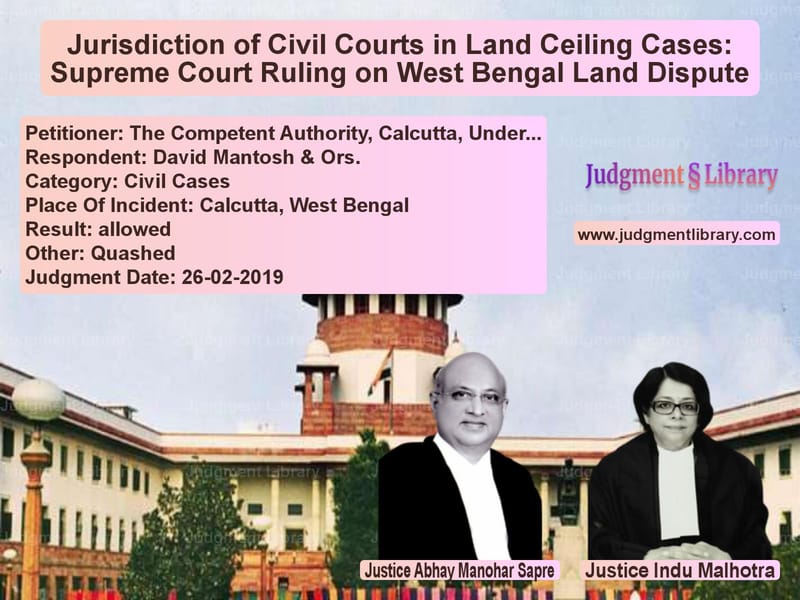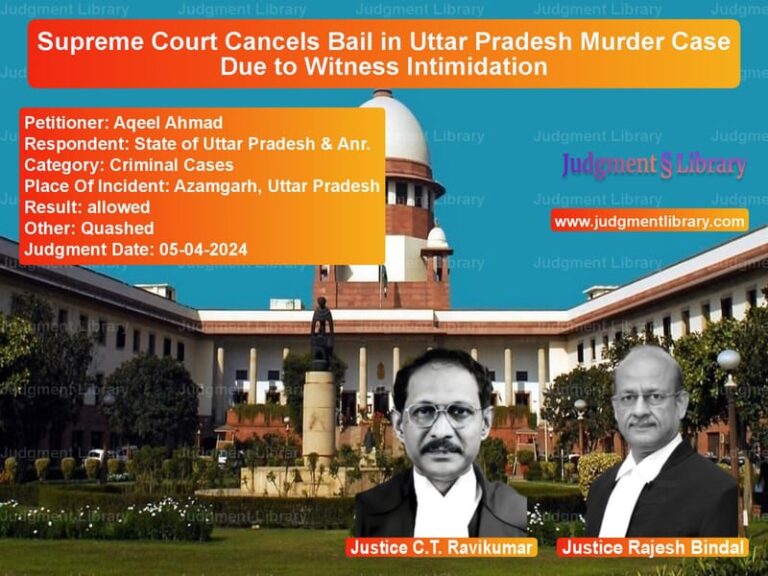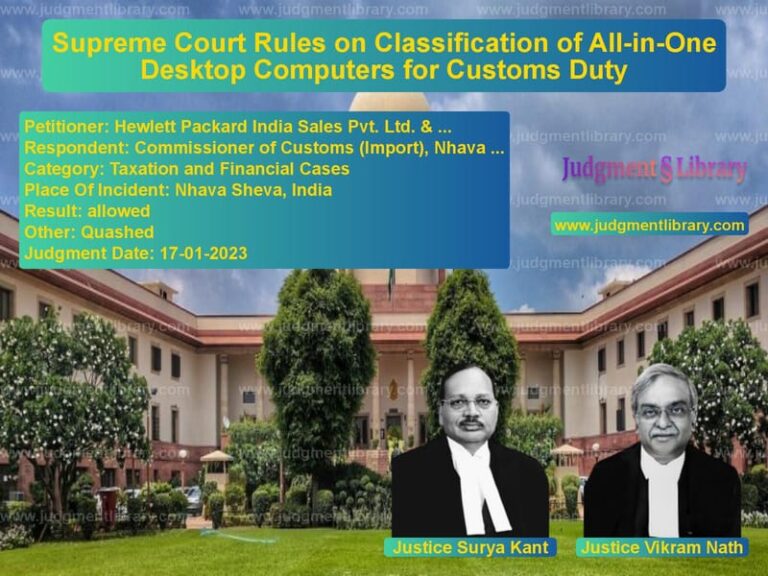Jurisdiction of Civil Courts in Land Ceiling Cases: Supreme Court Ruling on West Bengal Land Dispute
The Supreme Court of India has delivered a landmark judgment on the jurisdiction of civil courts in land ceiling disputes. The case involved a dispute over land in West Bengal, which was subjected to proceedings under the Urban Land (Ceiling and Regulation) Act, 1976 (ULCRA). The Court ruled that civil courts do not have jurisdiction to entertain suits challenging proceedings under the Act, reinforcing the principle that special laws override general laws.
Background of the Case
The dispute revolved around land in Calcutta, identified as premises No. 73, Canal Circular Road, which was originally owned by the predecessors of the plaintiffs (David Mantosh and others). Over time, the land changed hands and was eventually declared as surplus under the ULCRA. The State of West Bengal acquired the land and later leased it to Apollo Gleneagles Hospitals Ltd.
The plaintiffs, claiming ownership, challenged the acquisition through a civil suit, seeking a declaration that the acquisition was null and void. The trial court dismissed the suit, holding that civil courts had no jurisdiction over matters governed by the ULCRA. However, the Calcutta High Court’s Division Bench reversed this decision, ruling in favor of the plaintiffs and ordering the hospital to vacate the land or compensate the plaintiffs.
Key Issues Before the Supreme Court
The Supreme Court had to decide:
- Whether civil courts had jurisdiction to entertain the suit challenging land acquisition under the ULCRA.
- Whether the acquisition process was legally valid and binding on all parties.
- Whether the plaintiffs had a valid claim to ownership and possession of the land.
Arguments by the Competent Authority and State of West Bengal
The appellants, including the State of West Bengal and Apollo Gleneagles Hospitals Ltd., argued that:
- The ULCRA provided a comprehensive legal framework, and civil courts could not interfere with land acquisition proceedings.
- The plaintiffs had never objected during the ULCRA proceedings and had forfeited their rights.
- The High Court erred in overturning the trial court’s ruling and granting relief beyond its jurisdiction.
- The hospital had made significant investments in setting up medical infrastructure on the land, making eviction impractical.
Arguments by the Plaintiffs
The plaintiffs contended that:
- The land acquisition process was flawed and conducted without due process.
- They were not given an opportunity to present their case before the Competent Authority.
- The civil court had the power to examine the validity of government actions, including land acquisitions.
Supreme Court’s Observations and Ruling
The Supreme Court examined the provisions of the ULCRA and previous judicial precedents, including Dhula Bai v. State of MP and State of Bihar v. Dhirendra Kumar. The Court emphasized:
- Exclusion of Civil Court Jurisdiction: The ULCRA is a self-contained code that provides adequate remedies for landowners. Civil courts cannot entertain disputes that fall within the scope of the Act.
- Finality of Administrative Decisions: Once land is declared surplus and acquired by the State under the Act, its ownership is vested in the government, and courts cannot reopen settled matters.
- Failure to Challenge at the Right Time: The plaintiffs did not raise objections during the ULCRA proceedings and could not seek relief after the land had been lawfully vested in the State.
The Court stated:
“The entire scheme of the Act would make two things clear. First, the Act is a self-contained code in itself, which provides complete machinery for dealing with land ceiling disputes. Second, the Act gives finality to the orders passed by the appellate authority and expressly excludes the jurisdiction of civil courts in matters covered by the Act.”
Final Verdict
The Supreme Court allowed the appeal, setting aside the High Court’s order and reinstating the trial court’s judgment. It held that the civil suit was not maintainable and that the land legally belonged to the State of West Bengal. Consequently, the plaintiffs had no claim over the land.
Conclusion
This judgment reinforces the principle that when a special law provides remedies and procedures, civil courts cannot entertain parallel proceedings. The ruling protects government acquisitions from unnecessary litigation and ensures that land ceiling laws achieve their intended purpose of equitable land distribution.
Petitioner Name: The Competent Authority, Calcutta, Under the Land (Ceiling and Regulation) Act, 1976 & Anr..Respondent Name: David Mantosh & Ors..Judgment By: Justice Abhay Manohar Sapre, Justice Indu Malhotra.Place Of Incident: Calcutta, West Bengal.Judgment Date: 26-02-2019.
Don’t miss out on the full details! Download the complete judgment in PDF format below and gain valuable insights instantly!
Download Judgment: The Competent Author vs David Mantosh & Ors. Supreme Court of India Judgment Dated 26-02-2019.pdf
Direct Downlaod Judgment: Direct downlaod this Judgment
See all petitions in Property Disputes
See all petitions in Landlord-Tenant Disputes
See all petitions in Specific Performance
See all petitions in Judgment by Abhay Manohar Sapre
See all petitions in Judgment by Indu Malhotra
See all petitions in allowed
See all petitions in Quashed
See all petitions in supreme court of India judgments February 2019
See all petitions in 2019 judgments
See all posts in Civil Cases Category
See all allowed petitions in Civil Cases Category
See all Dismissed petitions in Civil Cases Category
See all partially allowed petitions in Civil Cases Category







